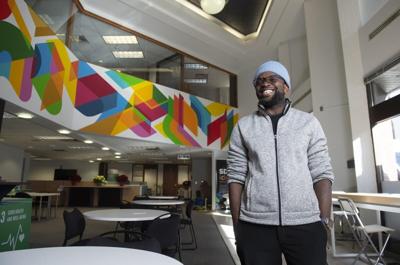
WATERLOO REGION — Kingsley Madu worked for years to develop the first BIPOC-focused credit union in Canada to help newcomers with no credit history in this country rent cars, hotel rooms and apartments.
From his own experience as an immigrant, Madu knows a credit union founded by, and focused on, Black, Indigenous and people of colour is long overdue.
When Madu and his family arrived from Nigeria at Toronto Pearson Airport in 2019, the problems started right away.
Madu’s Uber app was not working. The family had lots of luggage, an infant and a toddler and needed a ride to their hotel. He called the ride-hailing company and was told he had to have a Canadian credit card if he was going to use Uber in Canada.
He paid cash for a limousine ride to a nearby hotel.
The hotel said it would not honour the reservation because Madu did not have a credit card on file with that hotel chain. He had to pay cash, in advance, for three nights, even though the reservation was for a single night.
“It wasn’t the best of experiences,” said Madu.
That night in the hotel, Madu felt it was a mistake coming to Canada, and thought he and his family should return to Nigeria. But his wife had lived in Canada as a child and loved it, so she urged Madu to persevere.
With degrees in mechanical engineering and software development, Madu had worked in 15 different countries. For most of that time, he was a project manager in software development for multinationals like Schlumberger, the world’s biggest offshore oil drilling company. Before that, he worked for an American oil company and lived for a time in Texas.
Madu had more trouble getting established in Canada than anywhere else he lived.
When he found an apartment for his family, the property management company wanted a credit check and six months of banking records. When Madu went to open a bank account so he could rent the apartment, he was told that was impossible until he had a Canadian address.

“Who built this system?” he said.
At one point, Madu worked in the U.S. and had funds on deposit with JP Morgan Chase Bank. He contacted Chase in the U.S. and asked them to transfer funds to Canada, but they refused, saying he had to come into a Chase branch in person for security reasons.
After getting a ride across the border with a friend, Madu was finally able to access some of his funds and get his family settled in their adopted home.
“It was really painful and it was hard,” said Madu.
There is a big gap in the financial services sector for new immigrants that a BIPOC-focused credit union would solve, so in August 2020, Madu started developing a mobile app for a digital bank called Expedier.
As work advanced, he secured a partnership with the Digital Commerce Bank in Calgary that provides access to digital infrastructure for email Interac transfers and other services.
Thanks to an agreement with Equifax, a large credit tracking company, members of Expedier will see their monthly rent payments included in their credit score. They will have access to special credit cards so they can rent vehicles and hotel rooms. They can have money transferred into their Expedier accounts.
A digital credit union accessed through a mobile app on smartphones will appeal to young people in other countries who are thinking about emigration, said Madu.
By the end of January 2024, Madu expects to have a provisional licence from federal banking regulators to launch Expedier, which would allow it to collect membership fees. Within a year, Madu aims to have the full operational licence from Ottawa.
To open in Canada a credit union must have $1 million in assets. Expedier will raise that from the more than 5,000 people who have already signed up, he said.
In addition to developing Expedier, Madu teaches at Conestoga College and develops software for London, Ont.,-based ed-tech startup Let’s Talk Science.
Expedier was accepted into a Google incubator program, receiving a $300,000 injection of funds. And four months ago it was admitted into Liftoff, a tech incubator run by the Caribbean Canadian Association of Waterloo Region, which operates out of the SDG lab in downtown Kitchener.
Trevor Charles, the executive director of Liftoff, said the program was launched with a $3 million grant from Ottawa, and about 100 startups have gone through it.
Charles, a microbiology professor at the University of Waterloo, who has three startups of his own, said Liftoff was funded for three years, and there is one year remaining.
New investors and partners are needed to keep it going, he said.
“We built something we think is really valuable,” said Charles. “Can we offer it on a broader scale? Take it across the province or across the country?”
Like Our Story ? Donate to Support Us, Click Here
You want to share a story with us? Do you want to advertise with us? Do you need publicity/live coverage for product, service, or event? Contact us on WhatsApp +16477721660 or email Adebaconnector@gmail.com








26 thoughts on “A digital bank that wants to help newcomers”